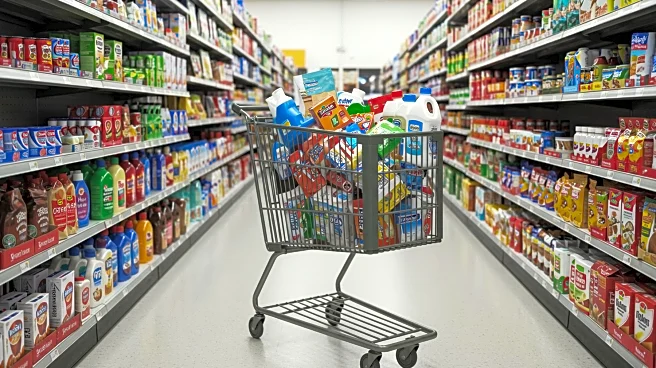What's Happening?
Amazon is increasingly leveraging its Everyday Essentials category to strengthen its position in the grocery market. These essentials, which include items like toilet paper, batteries, and pet food, have become a significant part of Amazon's marketplace, accounting for one-third of all products sold. According to Sam Heyworth, Amazon's VP of Consumables, the growth of this category has outpaced the rest of Amazon's U.S. online store, driven by improvements in the shopping experience. Despite challenges in its grocery ventures, such as the mixed success of Whole Foods and Amazon Fresh, Amazon's overall grocery sales, excluding these brands, have surpassed $100 billion. The company aims to simplify grocery shopping by offering a variety of purchasing options, including online and in-store, to meet consumer needs.
Why It's Important?
Amazon's strategic focus on Everyday Essentials is crucial as it seeks to dominate the grocery sector, a market characterized by high purchase frequency and significant consumer spending. By integrating these essentials into its broader grocery strategy, Amazon is positioning itself as a one-stop shop for consumers, potentially increasing customer loyalty and market share. This move could disrupt traditional grocery retailers by offering competitive pricing and convenience, challenging established players like Walmart. The success of this strategy could lead to further expansion in Amazon's grocery offerings, impacting the retail landscape and consumer shopping habits.
What's Next?
Amazon is likely to continue refining its grocery strategy, focusing on enhancing customer experience and expanding its product offerings. The company may invest in technology and logistics to improve delivery speed and inventory management. As Amazon strengthens its grocery presence, competitors may respond by enhancing their own offerings and customer service. The evolution of Amazon's grocery business will be closely watched by industry stakeholders, as it could set new standards for convenience and value in the sector.
Beyond the Headlines
Amazon's push into the grocery market highlights broader trends in consumer behavior, such as the increasing demand for convenience and value. The company's approach may influence other retailers to adopt similar strategies, emphasizing the importance of integrating online and offline shopping experiences. Additionally, Amazon's success in this area could lead to further innovations in retail technology and logistics, shaping the future of the industry.










